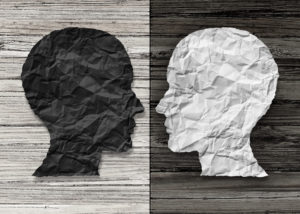At Northbound Treatment Services, we take special care to help individuals and their families manage and treat addiction through drug rehab by acknowledging a patient’s battle as one against mental illness and co-occurring psychological disorders.
Often times, aside from drug and/or alcohol addiction, doctors find that simultaneously, a person may also be suffering from one or more additional psychological disorders (dual diagnosis). Thus, giving need for special care and attention intended to separate, identify, and subsequently treat underlying psychological disorders that could contribute to drug and/or alcohol addiction, or vice versa.
Such an instance is known as comorbidity, or co-occurring psychological disorders. Drug addicts and alcoholics with co-occurring psychological disorders have a wide range of medical and social problems that must be addressed in drug rehab.
What Does it Mean to Have Co-Occurring Psychological Disorders?
Co-occurring psychological disorder is a term for when someone experiences a mental illness and a substance use disorder simultaneously.
Addiction IS a psychological disorder in itself. So let us first examine the definition of what that means. The words mental illness and psychological disorder are one in the same, and can be used interchangeably.
Mental illness is a disease that affects the flow of how a person relates to their environment, directly impacting thoughts, feelings or actions. The correct diagnosis makes the difference between which avenues of drug and/or alcohol treatment should be taken to provide a patient the ability to take back their life and handle social situations in a healthy manner through rehab.
What Causes Psychological Disorders?
The cause of psychological disorders is still somewhat of a mystery to the medical community. That said, suffering from such an illness is a very common occurrence.
Though there are millions of studies being conducted currently to get to the bottom of why and how a person could be affected by one or more of these psychological disorders, the exact origin remains unknown, and is usually specific to each individual.
Many studies have shown that a large component of developing psychological disorders is due to genetic and biological influences. Beyond that, one’s family upbringing/environmental setting is the next largest factor. Socioeconomic factors play an important role as well. Self identity and expression such as peer groups, economic status, race and sexual orientation can contribute to the stressors inducing the symptoms of psychological disorders.
Most importantly, however, it is extremely imperative to recognize that regardless of any of these socioeconomic conditions, no one is exempt or spared from the risks associated with developing psychological disorders.
Factors That Contribute to Causing Psychological Disorders
The good news is that there are some identifiable markers which commonly contribute to declining or impaired psychological health. Such as, but not limited to:
- Abuse or trauma during childhood; including neglect
- Discrimination, resulting in loneliness or isolation
- Low self worth or self esteem
- Poverty or substantial debt; including homelessness or unemployment
- Loss of loved ones or deteriorated support systems
- Long term stress or illness; chronic or otherwise
- Bullying, domestic violence, or physical abuse at any stage of life, especially during early adulthood.
- Physical injury
- Neurological or chemical imbalance
- Overwhelming and unnecessary responsibilities imposed upon an individual
- Learned or adaptation of unhealthy temperament as a coping mechanism
- Substance abuse
- Biological chemical imbalance in the instance of deformation
It is especially important to uncover the instance or obstacles an individual has encountered up until the present time, in order to properly diagnose, gauge, and treat one or more psychological disease or disorder.
The Most Common Types of Co-Occurring Psychological Disorders
The most difficult endeavor any person must face when making the decision to better themselves and find rehab is to simply commit to a treatment program. The rest is up to the staff and community within the rehab center (drug and/or alcohol) to guide the path toward a healthy and meaningful existence. The correct communication and diagnosis of a co-occurring psychological disorder is essential to one’s journey to a productive and healthy wellbeing. Below are some of the most common co-occurring psychological disorders according to the Diagnostic and Statistical Manual of Mental Disorders, also known as the DSM-5:
- Clinical Depression: Persistently depressed mood or loss of interest.
- Anxiety Disorder: Feelings of worry, anxiety or fear that are strong enough to interfere with one’s daily activities.
- Bi-Polar Disorder: Defined as having mood swings in mood from manic to depressive over short amounts of time.
- Dementia: Impairment of two or more brain functions such as memory loss or difficulty making judgements.
- ADD/ADHD: Difficulty with focus and attention.
- Schizophrenia: Delusions or paranoia that reflects in a person’s ability to make conscious decisions.
- Obsessive Compulsive Disorder: repetition of patterns of behavior that are deemed excessive.
- Autism: Social developmental disorder.
- Post Traumatic Stress Disorder: Difficulty recovering from a disturbing past event that overflows into present life causing stress and irrational reactions to triggers that can be seemingly unrelated.
- Substance Abuse/Addiction (abuse or dependence): An intense focus to compulsively abuse any substance to the degree that it interferes with bodily functions, behavior and/or rational and cognitive thought.
As we lean more and more into the depths of co-occurring psychological disorders and mental illness, the list and conditions will be forever evolving and developing. The more that is learned and shared in each individual case, ensures the most accurate diagnoses, resulting in the best possible care plan and management of any and all co-occurring psychological disorders provided by Northbound Treatment.
Why is Substance Abuse Addiction Considered an Illness?
Because of its complexity, substance abuse is most certainly considered an illness, as opposed to simply a choice, though choice plays an important role. Addiction alters one’s own ranking of needs and wants and creating new chemical pathways in the brain thereby creating a new sequence of compulsive behaviors that take over one’s impulses despite consequences. This is when substance abuse is identified as an illness.
Psychological Disorders and Where You Fit In
Co-occurring psychological disorders are considered very common, especially within the drug rehab community. A person suffering from an illness such as addiction, might not and usually does not, find themselves in a situation where they are able to place themselves in one specific category as far as ones emotional condition. More importantly, one might recognize, addiction and abuse as one significant illness, yet never consider there having there been a preceding, coexisting, or following illness or illnesses.
Co-Occurrence and the Importance of Unveiling
Having two mental, or psychological, disorders at the same time. This is what we consider co-occurring psychological disorder (dual diagnosis). In order to guarantee the best possible drug rehab care, the disease known as addiction or substance abuse syndrome, must be addressed hand in hand with any and all other psychological diseases. Though many are able to address chemical dependency as a condition in which must be managed, there are, more often than not simultaneous or even underlying mental or behavioral disorders playing an important role.
Domino Effect: Drug Misuse and Self Medication
Often times, one might also find themselves in a situation of cause and effect, just like a game of dominos. For example, because of the feeling of being in a state of clinical depression or mania, a person might choose to self medicate in order to feel relief. Another example would constitute a person suffering from ADHD, or the inability to concentrate effectively, to find comfort on the effects of a stimulant in order to soothe the discomfort, the same is true of anxiety and alcoholism, but not exclusively.
Co-Occurring Psychological Disorders vs. Drug Abuse
This is especially concerning when discussing the circulation of one psychological disorder feeding another. The result becomes in an infinite loop, then rewiring the brain. Keep in mind, this is not a suggestion that one disease is the direct cause of another. But simply that there are more than one psychological disorders “co-occurring” hindering the ability of one to reach an optimal state of wellbeing.
How Common is Dual Diagnosis?
Since the 1980’s, surveys and studies have been increasingly studied and continuously conducted on the matter of how often co-occurring psychological disorders are found to run parallel to one another. The intel gathered helped form the conclusion that individuals suffering from any one other psychological disorder, are twice as vulnerable to suffer from substance abuse addiction concurrently.
These studies suggest that treating only one the illness of dependence and addiction, will provide unsuccessful attempts in rehab, hindering the desired outcomes from even the best health and wellbeing plan. It is due to these findings that the importance of rehab among all co-occurring psychological disorders, present itself as of the utmost importance to achieve and maintain recovery as a whole.
How Can Northbound Help?
In recognition of these issues, Northbound offers a variety of services to address each and every one of our patients desire to overcome their tribulations. Northbound offers Basic-to-Advanced Life Skills Services and Groups, nutrition, and employment assistance.
The Northbound Academy, our superior college program, employs two full-time staff dedicated to addressing these continuing care issues.
Co-occurring psychological disorders are the norm in addiction treatment like drug and alcohol rehabs. Almost all drug rehabs in the United States and abroad have focused their attention on the treatment of co-occurring disorders.
Treating the dually diagnosed client is complicated, but at Northbound drug rehab facilities, we believe we have developed an addiction treatment model that specifically addresses, and aids in the treatment of any and all co-occurring psychological diagnosis. Our therapists, psychologists and addiction treatment specialists work together to develop individualized treatment plans for every client who enters Northbound drug rehab.
Northbound drug rehab has an extremely flexible treatment program that allows for highly individualized treatment, resulting in the highest success rate available to all who seek assistance in taking back control of their forever changing and valuable lives.
For more information about your treatment options give us a call at (866) 511-2458, or you can contact us here.
References:










